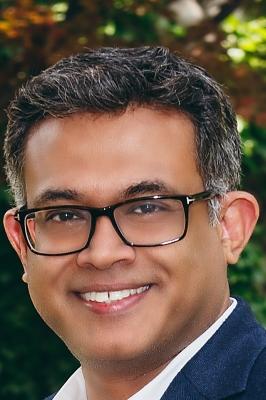
Suman Datta is the Joseph M Pettit Chair of Advanced Computing and Georgia Research Alliance (GRA) Eminent Scholar and Professor in the School of Electrical & Computer Engineering at Georgia Tech. He received his B.Tech degree in Electrical Engineering from the Indian Institute of Technology, Kanpur, India, and his Ph.D. degree in Electrical and Computer Engineering from the University of Cincinnati, Ohio, USA. His research group focuses on semiconductor devices that enable new compute models such as in-memory compute, brain-inspired compute, cryogenic compute, resilient compute etc.
From 2015 till 2022, Datta was the Stinson Endowed Chair Professor of Nanotechnology in the Electrical Engineering Department at the University of Notre Dame, where he was the Director of a multi-university microelectronics research center, ASCENT, funded by the Semiconductor Research Corporation (SRC) and the Defense Advanced Research Projects Agency (DARPA). Datta also served as the Director of a six-university research center for Extremely Energy Efficient Collective Electronics (EXCEL), funded by the SRC and National Science Foundation (NSF) to explore an alternate computing hardware that leverages continuous-time dynamics of emerging devices to execute optimization, learning, and inference tasks.
From 2007 till 2015, he was a Professor of Electrical Engineering at The Pennsylvania State University, where his group pioneered advances in compound semiconductor-based quantum-well field effect transistors and tunneling field effect transistors.
From 1999 till 2007, he was in the Advanced Transistor Group at Intel Corporation, where he led device R&D effort for several generations of high-performance logic transistors such as high-k/metal gate, Tri-gate and strained channel CMOS transistors. He has published over 425 journal and refereed conference papers and holds more than 187 issued patents related to semiconductor devices. In 2013, Datta was named a Fellow of the Institute of Electrical and Electronics Engineers (IEEE) for his contributions to high-performance advanced silicon and compound semiconductor transistor technologies. In 2016, he was named Fellow of the National Academy of Inventors (NAI) in recognition of his inventions that have made a tangible impact on quality of life, economic development, and the welfare of society.
- Ph.D., Electrical Engineering, University of Cincinnati, 1999
- B.Tech., Electrical Engineering, Indian Institute of Technology, Kanpu, 1995
Datta’s research focuses on the exploration of emerging semiconductor devices and their integration into novel computing architectures to address the physical limits of traditional CMOS scaling. His work is deeply rooted in system-technology co-optimization (STCO), specifically leveraging capacitive memories and monolithic 3D integration to overcome the "memory wall" in AI and high-performance computing. Currently, he is investigating the use of ferroelectric transistors (FeFETs) and amorphous oxide semiconductors (AOS) for advanced memory and logic applications. Another area of his current interest is the development of compute-in-memory (CiM) accelerators and the hardware acceleration of State Space Models (SSMs), Additionally, his research encompasses the reliability modeling of high-density ferroelectric arrays and the study of oxide semiconductor materials for BEOL (Back-End-of-Line) logic and memory integration.
Datta's teaching interests encompass fundamental and advanced topics in electrical and computer engineering, including semiconductor devices and solid-state physics. His instruction spans undergraduate and graduate courses, emphasizing a rigorous understanding of solid-state device operation and design principles. Professor Datta is committed to engaging students at all levels and integrating research insights into the curriculum to enhance learning outcomes.
- Intel Achievement Award for demonstration of high performance high-k metal gate CMOS transistors (2003) and Intel Logic Technology Quality Award for invention of Tri-gate transistors (2002)
- The SEMI Award for North America (2012) for first development, integration and introduction of a successful high-k dielectric and metal electrode gate stack for CMOS IC production, implemented at the 45nm node in 2007
- Best student paper awards at IEEE Device Research Conference (2010, 2011) and at IEEE Symposium on VLSI Technology and Circuits (2020)
- The Penn State Engineering Alumni Association (PSEAS) Outstanding Research Award (2012) and the PSEAS Premier Research Award (2015)
- Fellow of the Institute of Electrical and Electronics Engineers (IEEE) for contributions to high-performance advanced silicon and compound semiconductor transistor technologies (2013)
- Fellow of the National Academy of Inventors (NAI) in recognition of his inventions that have made a tangible impact on quality of life, economic development and the welfare of society (2016)
- J Sonawane, S Deng, C Zhang, O Phadke, F Waqar, S Datta, S Yu, Asymmetric Underlap-Overlap 2T Gain Cell Enabling Voltage-Sensing Readout with Minimized Capacitive Coupling, IEEE Electron Device Letters, 2026
- HJ Lee, M Sohn, S Yoo, Y Lee, K Kim, SG Nam, Y Park, S Jo, D Kim, ..., Laminated Ferroelectric Stack for Enhanced ISPP Slope and Endurance in FE-NAND, IEEE Electron Device Letters 47(1), 188–191, 2025
- H. Park et al., Extreme EOT Scaling in Tungsten-Doped In2O3 MOSFETs for Enhanced Stability and Drive Current, IEEE Transactions on Electron Devices 72(12), 7136–7144, Dec. 2025
- H. Park et al., Demonstration of Tungsten-doped Indium Oxide MOSFETs with 3 Å EOT, Improved Stability and High on-Current, VLSI Technology and Circuits 2025, Kyoto, Japan, 2025, pp. 1–3
- E. Sarkar et al., Analog In-Memory-Compute with Multi-bit Silicon Ferro FinFET Array for Improved Energy and Area Efficiency, IEEE International Memory Workshop (IMW) 2025, Monterey, CA, USA, 2025, pp. 1–4